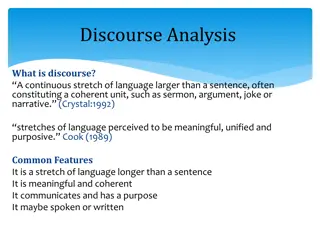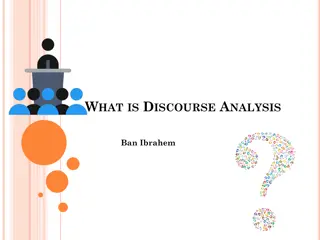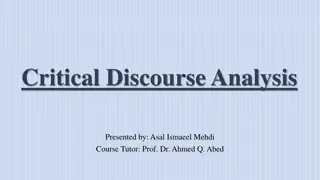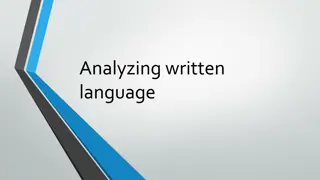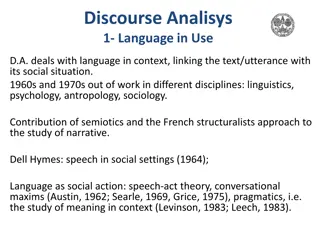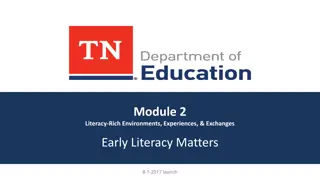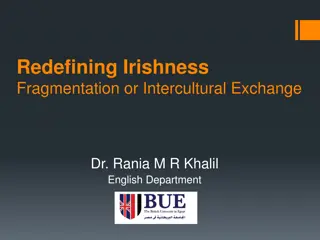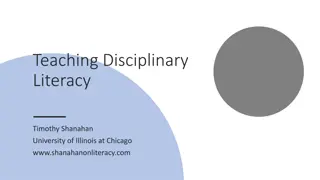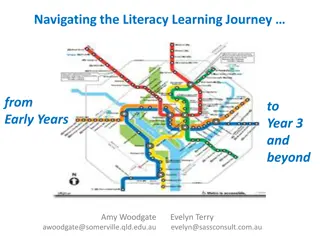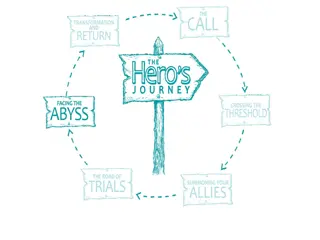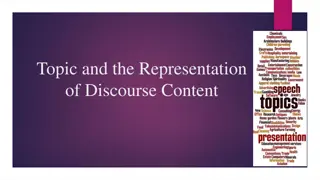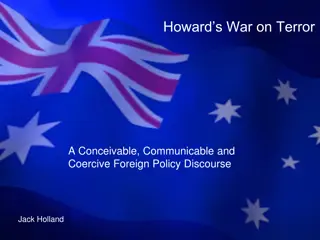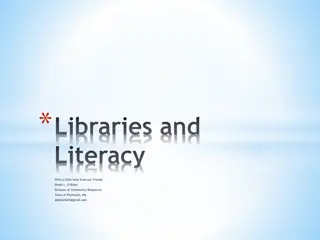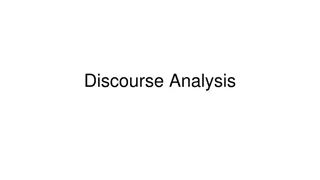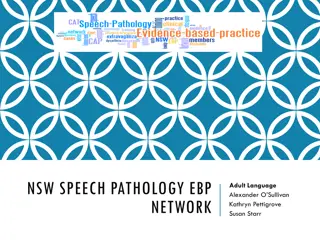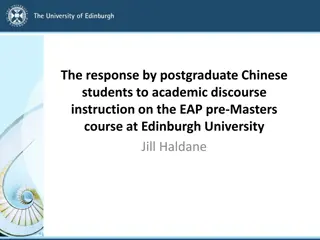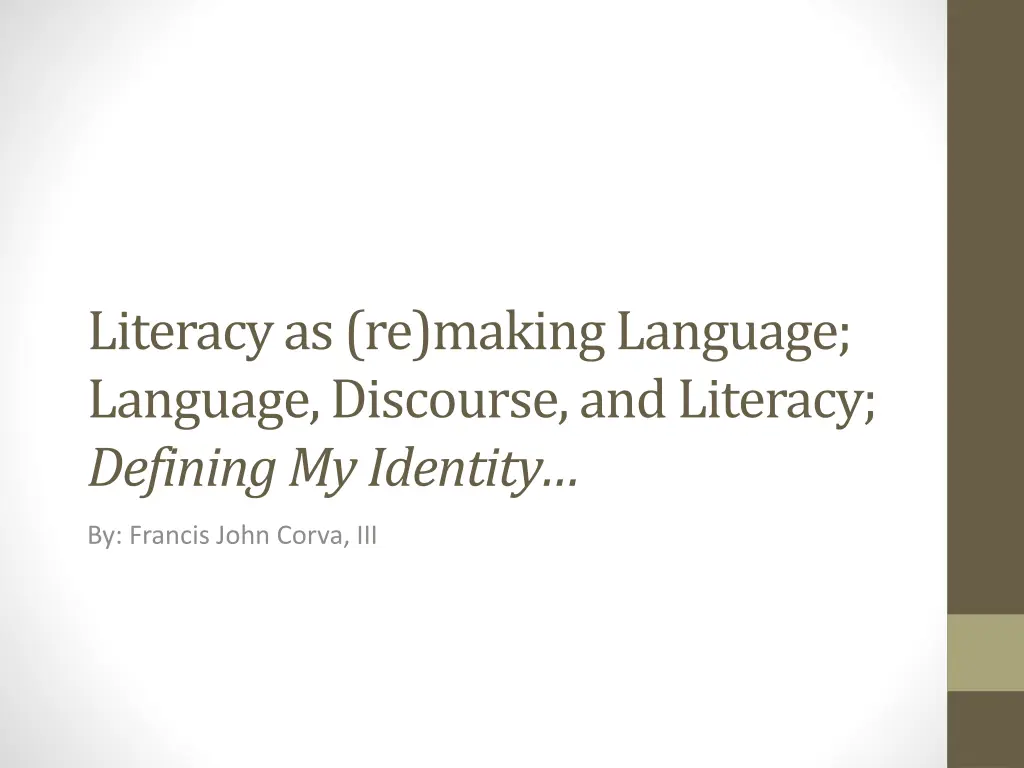
Understanding Language, Discourse, and Literacy: Insights on Communication and Identity
Explore the interconnected dynamics of language, discourse, and literacy in shaping communication, identity, and ideologies. Discover how literacy plays a pivotal role in acquiring knowledge, expressing oneself, and connecting with diverse communities.
Download Presentation

Please find below an Image/Link to download the presentation.
The content on the website is provided AS IS for your information and personal use only. It may not be sold, licensed, or shared on other websites without obtaining consent from the author. If you encounter any issues during the download, it is possible that the publisher has removed the file from their server.
You are allowed to download the files provided on this website for personal or commercial use, subject to the condition that they are used lawfully. All files are the property of their respective owners.
The content on the website is provided AS IS for your information and personal use only. It may not be sold, licensed, or shared on other websites without obtaining consent from the author.
E N D
Presentation Transcript
Literacy as (re)making Language; Language, Discourse, and Literacy; Defining My Identity By: Francis John Corva, III
Literacy as (re)Making Language The freed mind can also be frightened What are your thoughts on this quote?
Literacy as (re)Making Language Revolutions in France, Haiti, and the United States were based on the idea of freedom of the mind Freedom of the mind brings with it a certain weight though Who would rather think freely vs. mostly being told what to think? What are the benefits and drawbacks of each?
Literacy as (re)Making Language Dr. Frankenstein learns about the history of the human species and what it has done to the world and he is frightened. Why? After considering what the human species has done, the monster begins to consider his own place in the world. What does he feel as he finds his own place? Knowledge can lead us to either joy or sorrow or both. Why? Language is at the center of our ability to acquire new knowledge. When we read, we become connected to new ideas and we can become more empathic. Allowing ourselves to acquire new knowledge and feel certain things also allows us to grow and to attract different people into our lives
Language, Discourse, and Literacy Language is not just grammar; it refers to an interaction recognized by a specific community or a symbolic exchange in communication . (This is why even emojis can be considered language.) Discourse a common set of language-use practices that a group uses Discourse community this can be related to professions; doctors, teachers, business people, electricians all have their own way of talking What are some discourse communities in your life? Literacy refers to knowledge of discourse; the more we know about the different ways that people talk, the more literate we are
Language, Discourse, and Literacy genre conventions the kinds of language used in a given discourse community What sorts of genre conventions exist in our classroom community? What type of language is used in movie previews? Some example of different literacies within the English language would be: Standard American English (SAE) African-American Vernacular English
Language, Discourse, and Literacy When we acquire literacy, it can help to shape our ideology, or what we believe about the world. Literacy also shapes our understanding of what is possible. The more we understand about the world, the more things are possible. What is an example of this?
Language, Discourse, and Literacy When we acquire literacy, it can help to shape our ideology, or what we believe about the world. Literacy also shapes our understanding of what is possible. The more we understand about the world, the more things are possible. What is an example of this? Consider: Learning and instrument Learning to code Learning to read the New York City subway map Learning how to talk to new people
Language, Discourse, and Literacy When we acquire literacy, it can help to shape our ideology, or what we believe about the world. Literacy also shapes our understanding of what is possible. The more we understand about the world, the more things are possible. What is an example of this? Consider: Learning and instrument Learning to code Learning to read the New York City subway map Learning how to talk to new people Literacy can also be used to oppress certain groups. What is an example of this?
Language, Discourse, and Literacy When we acquire literacy, it can help to shape our ideology, or what we believe about the world. Literacy also shapes our understanding of what is possible. The more we understand about the world, the more things are possible. What is an example of this? Consider: Learning and instrument Learning to code Learning to read the New York City subway map Learning how to talk to new people Literacy can also be used to oppress certain groups. What is an example of this? Slaves were outlawed from reading in the American South
Language, Discourse, and Literacy When we acquire literacy, it can help to shape our ideology, or what we believe about the world Literacy also shapes our understanding of what is possible. The more we understand about the world, the more things are possible. What is an example of this? Having a metacognitive awareness of how you write and speak comes from reflecting upon the language in your life and how it is used in different contexts
Defining My Identity Through Language (Liao) metacognition thinking about thinking (thought processes) In writing a literacy narrative, we can reflect on how we have been taught to think through language and how language has shaped our identities A literacy narrative can: Define one s cultural identity Document a journey from confusion to fluency Be about insights from juggling several linguistic identities
Defining Ones Cultural Identity What does the word hapa mean?
Defining Ones Cultural Identity What does the word hapa mean? Half or part in Hawaiian; mixed asian
1. Defining Ones Cultural Identity What does the word hapa mean? Half or part in Hawaiian; mixed asian Can anyone think of words that describe their mixed identities? Identity, culture, and linguistic origins are all interconnected In a narrative, a narrator is struggling against a tension Do you use different language to define your life than your grandparents used?
2. Documenting a Journey from Confusion to Fluency From not knowing to knowing Re-learning a mother tongue What kind of anxiety, excitement, shame comes with re- learning a language? How did you gain access to the language? Who was your literacy sponsor? Which moments in learning the language really changed you? You want to walk the reader through the transformation process Did the way a discourse community (group) spoke ever attract you to join that group?
3. Insights from Juggling Several Linguistic Identities We can have multiple identities based on the multiple language we speak Showing the reader the contrast, and maybe conflict, between these identities makes your narrative interesting What are some of the awkward moments that resulted from these multiple identities? Does it feel like having multiple identities is a superpower or a drawback? (Has your answer to this changed over time?)
Tips for Writing a Successful Literacy Narrative Something must change over the course of the narrative The narrator must illustrate her or his experiences for the reader; this is where including dialogue and key details is particularly important Being with a single instance to grab the reader s attention; this will be your hook What is the takeaway or the lesson that your story teaches? This will be your thesis. Your story should bring a larger concept to the attention of the reader without necessarily explicitly stating the thesis In the process of writing your literacy narrative, you might make connections or uncovering hidden meanings or ideas that you may previously not have realized



